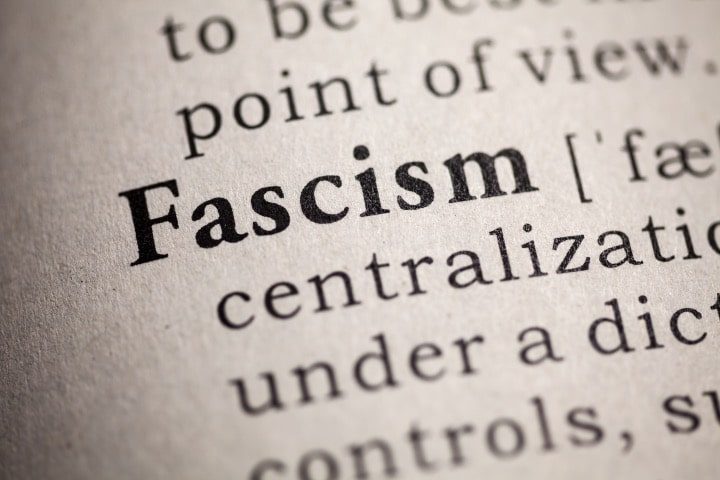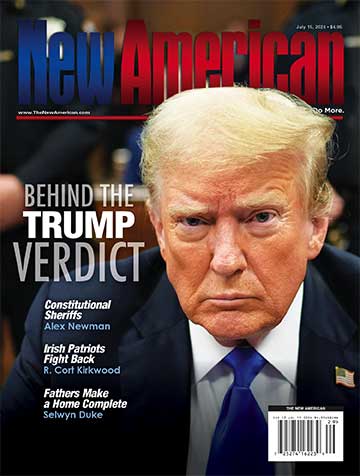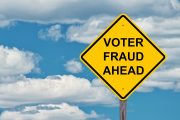
It has become so obvious that even the less astute among us have noted leftists’ reflexive habit of projection: They tend to accuse others of what they themselves are guilty of. They’d say Covid realists were “science deniers” even as they insisted a boy could will himself into being a girl. They’d say the Right is violent even while winking and nodding at 2020’s 600-plus left-wing riots. They’ll say conservatives are “racist,” but turn around and demonize white people. Then there’s their love for hurling the pejorative “fascist.”
An interesting example is an anti-Trump Atlantic article written by Christopher R. Browning, professor emeritus of history at the University of North Carolina at Chapel Hill. Oh, Browning wants to appear objective, saying that, unlike others, he resisted the left-wing habit of labeling President Donald Trump a fascist. And he still denies that 45’s presidency was “fascist” — but, he warns, a second Trump term seems poised to become so.
But before Browning predicts the future, he should first aim to understand the past; and before trying to learn whether Trump or anyone else is a fascist, he should learn what fascism is.
The closest the professor comes to defining the term is in his second paragraph. “Fascism was most fully exemplified by the regimes of Benito Mussolini and Adolf Hitler,” he writes. “These regimes combined totalitarian dictatorship, wars of imperial conquest, and outright genocide in the case of Hitler (of Jews, Slavs, Roma) or ethnic mass murder in Mussolini’s case (of Libyans, Ethiopians, Slovenes).”
Browning then admitted, “Placing Trumpism in the same category seemed to me trivializing and misleading.” Yet, he later writes (my additions in square brackets): “Trumpism did exhibit distinct elements of the fascist style of politics: the inflammatory rallies [such as calling much of the country “a basket of deplorables” or “semi-fascists”?]; the incessant mongering of fear, grievance, and victimization [identity politics?]; the casual endorsement of violence [the 600-plus riots]; the pervasive embrace of conspiracy theories [Trump/Russia-collusion hoax?]; the performative cruelty [J6 hearings?]; the feral instinct for targeting marginalized and vulnerable minorities [such as believing Christians and pro-lifers]; and the cult of personality [Obama, the “One”?].
Of course, all the square-bracket additions relate to Democrat/leftist phenomena. Add to this the Left’s heavy censorship (e.g., via Big Tech), and we could ask: Who, again, is the fascist?
Not Trump, apparently (yet). As Browning later writes, “Thankfully … Trump himself was too lazy, inexperienced, and unprepared to set about systematically constructing a true dictatorship.”
This is a curious thought. Since dictatorship inevitably involves the centralization of power, how do Trump’s alleged autocratic instincts square with his decentralization of power, his deregulation and effort to shrink the federal government? What ideological group is it, in fact, that ever seeks to centralize power? And what is fascism, anyway?
An old essay in the Laissez Faire City Times provides some insight. Writer “James Henry noted that, ‘The state of American education being what it is, the vast majority of people are totally incapable of recognizing a fascist economic program, even when it is used to slap them in the face,’” the site related in 1999. “‘This is because they have not been taught that fascism means state direction of the economy, cradle to grave “social security”, complete control of education, government intervention in every nook and cranny of the economy — and the belief that the individual belongs to the state.’”
Okay, now, which major party’s program does this sound like?
The Times was not exaggerating, either. “Everything for the State, nothing outside the State, nothing above the State” was how fascism founding father Benito Mussolini characterized the ideology’s spirit. Note, too, that Mussolini was a member of Italy’s socialist party until disagreement over WWI involvement led to his pro-war faction’s expulsion. He was a leftist.
And here’s a bit more history: The term “fascism” apparently originated with the Latin word “fasces”; this referenced a bundle of rods with an axe protruding that Roman magistrates used to symbolize their power. Thus is it “a little unnerving that the symbol of the fasces also appeared on the reverse of the ‘Winged Head of American Liberty’ or ‘Mercury’ dime in 1916,” wrote the Times. “That just about coincides with the period the Marxist tenet of progressive income tax became an American institution, and the Federal Reserve Corporation was inserted as a central banking monopoly inside the American banking system.” Coincidence?
Well, consider that the Times also writes:
And what do we really remember of Mussolini and Hitler from today’s university history? Do we remember that socialist icon George Bernard Shaw highly praised Mussolini for his collectivist policies, or that the venerable Mahatma Gandhi called him a “superman?” Gandhi’s term became the catchword description of Mussolini for the cultural elite of his day. And we’ve forgotten that the chairman of the U.S. House Foreign Relations Committee told his colleagues in 1926 that Mussolini “is something new and vital … It will be a great thing not only for Italy but for all of us if he succeeds.” And we for some reason can’t remember that in the 1930’s prominent banker Otto Kahn said that the world owes Hitler “a debt of gratitude.” Or that Arnold Toynbee thought he was a “man of peace,” or that the French intellectual Andre Gide said that he “behaves like a genius … Soon even those he vanquishes will feel compelled … to admire him.” Neither can academia recall that in 1934 the president of Hunter College in America declared that Hitler was “destined to go down to history as a cross between Hotspur and Uncle Toby and to be as immortal as either.”
In other words, yesterday’s liberal pseudo-elites didn’t recognize de jure fascism as evil any more than today’s recognize de facto fascism as fascism. Just keep on worrying about Trump, they say, the man with no establishment power — and keep empowering the people who foisted Covid lockdowns and untested drugs on all of us.



